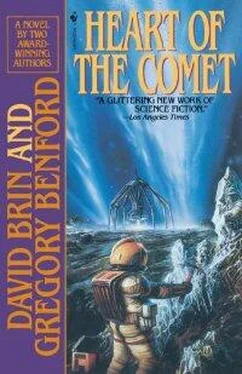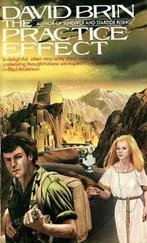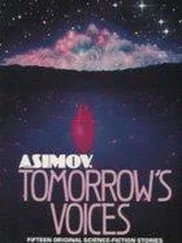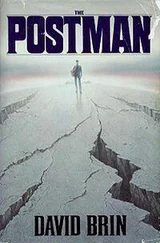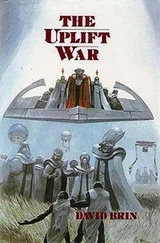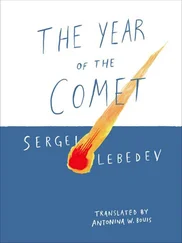He and Jeffers fixed the spider, reanchoring the foot and reflexing the leg. Carl cut away the damaged portion. Jeffers held the oxygen feed while he slapped a spindly girder segment into the opening. At Carl’s signal, the other spacer played the gas jet over the seams and the metal leaped to life, self-welding in a brilliant orange arc. They had the repair done before Kato’s body was back on the Edmund.
Umolanda came over the rim of Halley Core, pale blue jets driving her along the pole-to-pole cable. The easiest way to move around the irregular iceball was to clip onto the cable and fire suit jets, skimming a few meters above the surface. Magnetic anchors released automatically as you shot by, to minimize friction.
Umolanda was in charge of interior work, shaping irregular gouges into orderly tunnels and rooms. She met Carl near the entrance to Shaft 3, a kilometer from the accident site. The piledriving spider labored away again on the horizon.
—Pretty bad about Kato,— she sent.
“Yeah.” Carl grimaced at the grisly memory. “Nice guy, even if he did play those old junk movies on the 3D all the time.”
—At least it was quick.—
He didn’t have anything to say to that, didn’t like talking a whole lot out here anyway. It just interfered with the job.
Umolanda’s liquid eyes studied him through a bubble helmet spattered with grime. The neck ring hid her cleft chin. He was surprised to see that this omission revealed her as an otherwise striking woman, her ebony skin stretched by high cheekbones into an artful, ironic cast. Funny, how he’d never noticed that.
—Did you investigate the cause?—
“I checked the area where the spider leg got loose,” Carl answered. “Looked like a fault under it gave way.”
She nodded. —Not surprising. I’ve been finding hollows below, formed when radioactive decay warmed the ice long ago, as Halley formed. If some hot gas from the spider’s digging worked its way back to the surface through one of those hollows, it could undermine the spider’s anchor.— Carl squinted at the horizon, imagining the whole cometary head riddled with snaking tunnels. “Sounds about right.”
—Shouldn’t the spider have cut off as soon as it lost focus?—
“Right.”
—The switch?—
“Damn safety cutoff was defective. Just didn’t kick in,” Carl said sourly.
Her eyebrows knitted angrily. —More defective equipment!—
“Yeah. Some bastard Earthside made a little extra on the overhead.”
—You’ve reported it?—
“Sure. It’s a long walk back for replacement parts though.” He smiled sardonically. There was a brief silence before Umolanda spoke again.
—There will always be accidents. We lost people at Encke, too.—
“That doesn’t t make it any easier.”
—No… I guess not.—
“Anyway, Encke was a pussycat of a comet. Old. Sucked dry. Lots of nice safe rock.” He scuffed the surface softly with a boot tip. Snow and black dust puffed at the slightest touch.
She forced a grin. —Maybe all this ice is supposed to keep us alive over the long haul, but it’s killing us in the short run.—
Carl gestured toward three mechs which stood nearby, waiting for orders. Already the machines were pitted and grimy from Halley’s primordial slush. “That’s your team. Kato was shaping them up. But you might want to give ’em a once-over, anyway.”
—They look okay.— Umolanda whistled up the color-coded readout on the back of the nearest one and nodded. —Some luck here. The microwave beam didn’t hit them. I’ll take them down, put them to hollowing out Shaft Three.—
She tethered the boxy, multiarmed robots and gracefully towed them to the tunnel entrance. Carl watched her get them safely aligned and disappear down the shaft, leading the mechs like a shepherd, though in fact the mechs were as smart as a ten-year-old at some things, and a lot more coordinated.
He went on to check out more of the equipment that other crewmen were ferrying down from the Edmund. It was dull labor, but he had been working in the shafts for days and needed a break from the endless walls of rubble-seamed ice.
Overhead, gauzy streamers wove a slow, stately dance. Halley’s twin shimmering tails were like blue-green silks. They were fading now, months past the brief summer crisping that came for the comet every seventy-six years. But still the banners of dust and ions unfurled, gossamer traceries waving as if before a lazy breeze, the flags of vast angels.
The expedition had elected to rendezvous with Halley’s comet after its 2061 perihelion passage, when the streaking planetoid was well on its way outward again. Here, beyond the orbit of Mars, the sun’s violent heating no longer boiled off the huge jets of water molecules, dust, and carbon dioxide that made Halley so spectacular during its short summer.
But heat lingers. For months, as Halley swooped by the fierce, eroding sun, temperature waves had been diffusing down through the ice, and rock, concentrating in volatile vaults and scattered clumps of rock. Now, even as the comet lofted back into the cool darkness of the outer solar system, there were still reservoirs of warmth inside.
The gritty, dark potato shape was a frozen milkshake of water, carbon dioxide, hydrocarbons, and hydrogen cyanide, each snow subliming into vapor at a different temperature. Inevitably, in some spots, the seeping warmth melted or vaporized ices. These pockets lay waiting.
Carl was partway through assembling a chemical filter system when he heard a sharp high cry on suit-comm.
Then sudden, ominous silence.
His wrist display winked yellow-blue, yellow-blue: Umolanda’s code.
Damn. Twice in one shift?
“Umolanda!”
No answer. He caught the polar cable and went hand over hand toward the mouth of Shaft 3.
Mechs milled at a cave-in, digging at the slowly settling ice amid swirls of sparkling fog. No signal from Umolanda. He let the mechs work but popped pellet memories out of their backpacks to scan while he waited. It was soon apparent what had happened.
Deep in the ice, the mechs had dutifully chipped away at the walls of the first vault. Umolanda controlled them with a remote, staying in the main tunnel for safety. The TV relay told her when to sequence the robots over to a new routine, when to touch up details, when to bore and blast. She hung feathered, and monitored the portable readout board, occasionally switching over to full servoed control of a mech, to do a particularly adroit bit of polishing.
She had been working at the far end of what would soon be a storage bay when a mech struck a full-fledged boulder of dark native iron two meters across. Captain Cruz had asked them to watch out for usable resources. Umolanda put all three mechs to retrieving it. Under her guidance they slipped levers around the boulder and tried to pry it free. The sullen black chunk refused to budge.
Umolanda had to come in close to inspect. Carl could envision the trouble; mechs were good, but often it was hard to see whether they were getting the best angle.
Carl had a dark premonition. The boulder had been absorbing heat for weeks, letting it spread into a slush that lay intermediately behind it, a pocket of confined carbon dioxide and methane. This frothy soup would be perched at its critical point, needing only a bit more temperature or a fraction less pressure if, burst forth into the vapor phase.
Oh for chrissakes, Umolanda don’t …
A mech slipped its levering rod around the boulder, penetrating into the reservoir of slush. Umolanda saw the robot lurch, recover. She told it to try again, and moved a little closer to observe.
The mech was slow, gingerly. Its aluminum jacket was spattered and discolored from several days in the ice, but its readouts showed it was in perfect running order. Using as its pivot its own tether in the wall, it levered around the boulder, lunged—and the iron gobbet popped free.
Читать дальше
